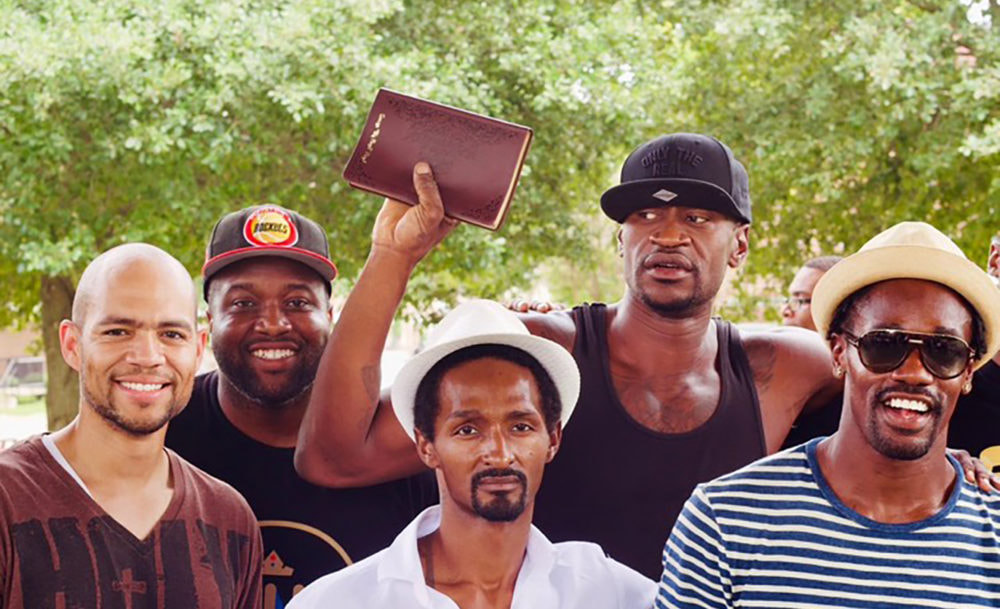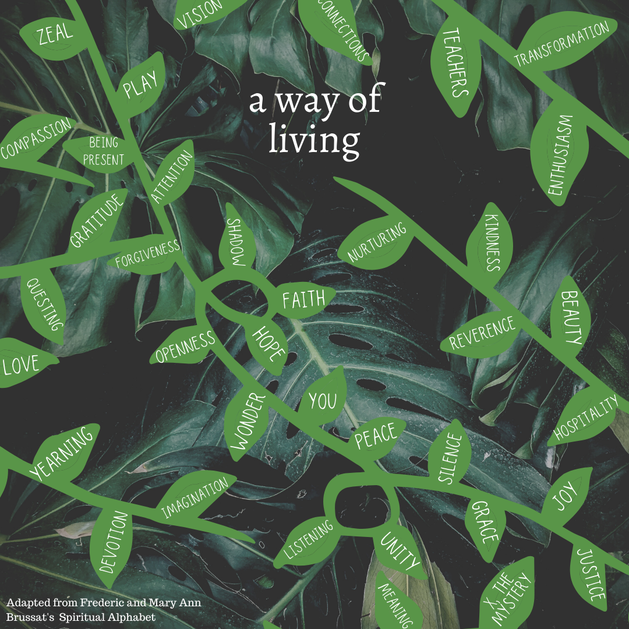A Passion for Compassion
applying the spiritual alphabet to the contemporary moment
“There is a new movement being born right now. A movement against hatred. And the elements of that movement includes racism, which traces its origin back 400 years, antisemitism, sexism, and xenophobia." (Bernard Shaw, CNN, June 4, 2020)
In a television interview, retired CNN anchor Bernard Shaw predicted that, in the forthcoming election in the US, there will be a landslide vote against the current powers that be. He believed that a movement against hatred is emerging in the US. I hope so. But I also know that it cannot be born as simply something against hatred. Nor it can grow through moral outrage alone. Or through self-satisfied proclamations of righteous indignation voiced by liberal elites. It must also be born from a hope for compassionate community that is translated into concrete terms: educationally, legislatively, politically, culturally, and spirituallly. It must come alive through a passion for compassion. A passion for building and sustaining compassioniate communities where no one - no one - is left behind. In a compassionate community, no one sits at the back of the bus, inhaling the dust and fumes of the comfortable. And no one dies from a knee on the neck.
I borrow this idea from the compassionate city movement, founded by Karen Armstrong. Please understand, a compassionate city has an edge to it, a discomfort. Armstrong writes:
“A compassionate city is an uncomfortable city! A city that is uncomfortable when anyone is homeless or hungry. Uncomfortable if every child isn’t loved and given rich opportunities to grow and thrive. Uncomfortable when as a community we don’t treat our neighbors as we would wish to be treated.”
Yes, I hope for compassionate, uncomfortable cities. In the spiritual alphabet “H” is for hope. But hope is really too weak a word. What can move people spiritually today is a passion for compassionate community. This passion includes hope, but it also includes so much more. It includes silence and shadow, justice and joy, imagination and openness, enthusiasm and devotion, faith and forgiveness, playfulness and joy, a zest for life itself. It includes so many of the letters in the interfaith spiritual alphabet. I offer a word about some of them:
Silence. Sometimes we might think of silence as a contemplative resting in divine presence, as in centering prayer. But it can also be the shutting off of presumptions of privilege, perhaps inherited from society, such that a person (or group of people) can hear the voices of others on their own terms and for their own sakes. It can be, for example, a shutting off of ideas that presume ‘whiteness’ as a norm by which the world is evaluated. Equally important, silence can be collective as well as individual. It can emerge in groups of people, not simply individuals, as they awaken to the fact that their own habits of thought have been seduced by the arrogance of white privilege. It can be a shared silence.
Shadow. Sometimes we might think of shadow as a personal recognition of individual sins, as in personal confession. It can be the honest recognition of an addict, for example, that he is indeed an addict and that things must change. But it can also be a recognition of collective sins that are part of society, such as the myriad ways in which people of color are sent to the “back of the bus” from the day they are born by economic inequities and forms of discrimination. It can be the honest recognition on the part of a group of privileged people that, in fact, they are privileged, and the privilege is unjust. It can be a recognition of collective shadows.
Justice. “J” is for justice. For some the word justice refers primarily to fairness. Some limit justice to the process by which wrongdoers get their ‘just’ due. Thel limit it only to retribution, vengeance. But let justice be a word for what Dr. Martin Luther King, Jr. called beloved community. Or to what process philosophers call compassionate communities. Compassionate communities are creative, caring, participatory, diverse, inclusive, humane to animals, and for the earth, with no one left behind. And let a passion for justice emerge, not out of anger alone (which has its own kind of creative energy) but also out of a passion for compassionate communities. In the spiritual alphabet “C” is for compassion and “P” is for passion.
Devotion and Enthusiasm. “D” is for devotion and “E” is for enthusiasm. A passion for compassion can be generated from anger, but it can also be generated out of a sense of the sheer beauty, the sheer attractiveness, of the ideal itself. There is something inherently attractive, indeed beautiful, about compassion that transcends moral obligation. Yes, we ought to be compassionate; obligation has its place. But we rightly sense that compassion is refreshing and nourishing in ways that far transcend the hatreds of the present moment. We feel called by it, devoted to it, not as a slave is called by an enslaver, but as a lover of music is called by songs she loves.
So once the silence has emerged, an owning of the shadow has begun, and people of privilege find their hearts burning with a passion for compassion, what do they do? To be sure, they – we – must act in whatever ways we can to change society. We must move past the idea that social change happens mechanically by changing laws and policies or even systems. It happens when attitudes and hearts, when habitual ways of thinking, are changed, too. And these internal changes require additional practices.
Openness and Listening. “O” is for openness and “L” is for listening and love. If you belong to a world of privilege, once you feel called by the possibility of compassionate community, you find yourself wanting to listen to voices other than your own. You want to understand the experiences and perspectives, the hopes and the dreams, the suffering and the pain, of those who are different from you. You want to be open. One way to be open is to listen without preconceived agendas. These preconceived agendas can include the idea that, once you hear the voices of others, you will discover common experiences, or that what you hear will be ‘pleasant’ by your own standards. Yes, you may discover common experiences and what you hear may be pleasant, but these two agendas get in the way of genuine listening. You listen because you want to feel their feelings, however different and dissonant from your own.
Faith and Transformation. This kind of listening is possible only with faith. Not faith as fervent belief in some ideas that seem ‘true’ but rather faith as trust in the availability of fresh possibilities for creative transformation. The faith is that there is something in the universe, some spirit of healing and whole-making, that is on the side of compassion and found in compassion itself. Something that presents itself in human life through new and unanticipated possibilities for goodness and love, despite expectations to the contrary. This something can be named in different ways: “God” or “Spirit” or “Creative Transformation” or “The Face of the Deep.” If we belong to the world of privilege, we can listen to others with help from a faith that we ourselves, and society as well, can be transformed by this spirit. Without such faith, we are too afraid and too defensive. We can hear only ourselves.
Kindness and Forgiveness. Transformation into what? Part of the answer, offered by Martin Luther King, Jr. and so many others, is love and kindness. In the spiritual alphabet “L” is for love and “K” is for kindness. The very idea of a beloved community is that of a loving community where people are kind to one another and, so process theologians and many others add, kind to animals and the earth. In such a society, as Dr. King also emphasized, following Jesus and Gandhi, they must somehow learn to love their enemies. This need not mean feeling affection for their enemies or wanting to be friends with their enemies. But it does mean wanting the well-being of even those whom they might otherwise hate. In a compassionate community there can be anger, but not hatred. Hatred is replaced by forgiveness: understood as wanting the well-being of others, all others. In process theology we speak of this more universal love as world loyalty.
Imagination and Play. When people feel beckoned by the lure of compassionate community, they find themselves needing to be and wanting to be more imaginative. They want to break free of the conventional standards and moralities of local culture, especially privileged culture, and think in ways that are truly open to a more compassionate society and more joy in the world. They also know that the passion for compassionate community cannot itself be sustained unless it is refreshed by a sense of humor, by a capacity for having fun, for a sense of play. The overly serious mind, obsessed with justice at the expense of play and incapable of joy, is a hindrance to the very possibility of beloved community, because a truly ‘beloved’ community is filled with joy and vibrancy, with zest for life.
Connection and Zest for Life. Not all in a compassionate community will be religious or spiritually minded. Not all will believe in a Life in whom all lives unfold, which we process theologians call God or the Harmony of Harmonies. Their spirituality will be a spirituality of connection and community, albeit understood in non-theistic terms. Indeed, what I said about “faith” may not make sense to them, at least insofar as the very word faith can suggest a transcendent reality. They may have faith in life, but not faith in Life.
As a process theologian I believe the two are closely associated. My own faith in Life inspires me to have faith in life. In the words of Genesis in the Bible, life itself is “very good.” But a compassionate community needs to be diverse, and this diversity includes those for whom the very idea of something more does not make sense. What is important is that such a community is filled with a spirit of biophilia, of a love of life itself, as incarnated in the lives of actual people, in particular circumstances, young and old and in-between, of many different races and philosophies and ethnicities, living together and committed to life’s well-being in their local settings. They can have fun together! They will feel connected with one another in caring and compassionate ways, such that no one is left behind, and that connection, beginning with family and friends but extending beyond, will be part of their spirituality. They will love life, and that love will be their religion, even if they have no other religion. A passion for compassion can include, and must include, a passion for the enjoyment of life itself, for any and for all. Only if there is a capacity for merry-making as well as justice-making, can there be any semblance of the wholeness for which the heart yearns. A wholeness that is against hatred, to be sure, and just as deeply, a wholeness that is in love with life itself, however finite and fragmentary, however small in the cosmic scheme. Out of that love of life can emerge a movement to which religious and non-religious alike can contribute and make real. Out of that love can come “love.” In the spiritual alphabet “L” is for love as well as listening. The two go together.
Jay McDaniel, June 2020

